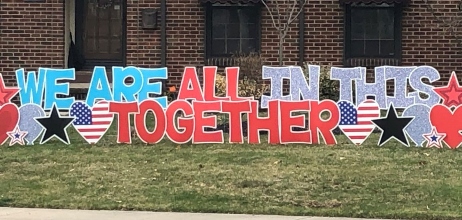 By Ward Shope
By Ward Shope
Chances are you’ve heard this phrase frequently recently. Embedded within this message is the understanding that we are restricting ourselves in a number of ways for the health of the greater whole. I stay home, not only so that I don’t get the coronavirus, but so that I don’t become a transmitter through which others may contract the disease. I wear a mask to protect you. You wear a mask to protect me. I wash my hands 20 seconds and wear gloves, not only for me, but for you. And if we all stick together, by staying apart, we can defeat a virus that we have no way of stopping any other way at this point.
Of course the implications of this all can get complicated and messy. I now teach my children at home for the greater good of the community. I teach my students online and prepare lessons in a way I’m not comfortable with for the sake of others. My job changes. I either adjust to digital employment from home, or because of my essential work, I put myself in danger for sake of others; or I have little to do and risk being furloughed or unemployed—for the sake of the good of community. There are unpleasant sacrifices to be made, and sometimes (often?) we chafe at them.
In many ways this is a refreshing message in a culture that has prided itself in individualistic philosophies. “Freedom for all and in all” has been the rallying cry. COVID-19 has exposed the myth of our self-determination and self-absorption. When we look at the deepest commitments of all of our lives, there are restrictions that we either place on ourselves, or receive willingly from others, in order that we might succeed individually or corporately as a team. Marriage vows, which seek to promote deep intimacy usually include the idea that regardless of what happens, we will stick together for the best of the other. We can charge parents with criminal acts if they neglect their children by refusing to restrict their own actions to their children’s detriment. We actually do need others and find our deepest life meaning with one another through restricting ourselves—often happily.
This doesn’t mean that the community corrective we are experiencing now doesn’t have other drivers, or that it will last beyond COVID-19. The lack of toilet paper and other products on the grocery shelves, the rise in gun sales, and the act of staying home may be indicators that fear is also at the door. Not all mask wearing and hand washing is selfless.
Still, there is an echo of the Kingdom here. The call to accept the unpleasantness (sufferings) of our times carries a biblical theme of self-sacrifice and the willingness to lay down our lives for others. By the Spirit we seek to overcome our worst character traits (sin patterns) not so that we won’t embarrass ourselves, but that others might be served and be drawn to the person of Jesus. And in fact, believers now have many means to show practical selfless love to others simply by making the commitment to live for community in a time of isolation.
Living a joyful life within the limits of his Father’s calling led to Jesus’ lonely death on the cross, but also leads to the emergence of a resurrected community of self-less, loving, worshipping people. It’s possible that the sufferings of our time have given us an additional and powerful paradigm to explain the Kingdom to others. And we had nothing to do with thinking it up. We are simply called to live it out for the sake of others.
